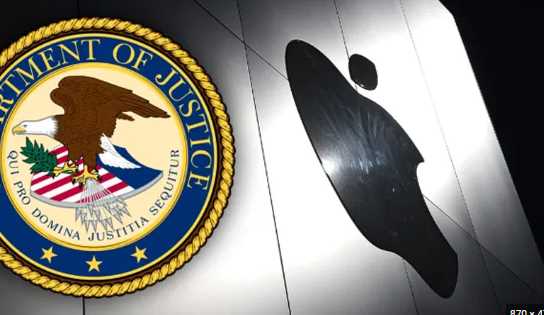
DOJ filed a suit on Apple for iPhone monopoly in antitrust case
Apple is the target of a historic lawsuit brought by the US Department of Justice on Thursday, which charges the company with monopolizing the smartphone industry.
Highlights:
- US Department of Justice sues Apple for alleged smartphone industry monopoly.
- Lawsuit accuses Apple of limiting OS to raise prices and impede competition.
- Apple denies claims, prioritizing user experience, while Chamber of Progress defends Apple's ecosystem.

Attorneys general from 15 states and the District of Columbia have joined the civil lawsuit, which charges Apple of limiting its smartphone operating system in a way that raises consumer prices and makes it difficult for developers to effectively release goods on rival smartphone platforms.
"Antitrust laws should not require consumers to pay higher prices," Attorney General Merrick Garland stated in a news release.
Among the claims in the lawsuit are:
What the DOJ refers to as "super apps"—apps that would facilitate customers' switching between smartphone platforms—are successfully deployed, but Apple blocks them. The creation of cloud-streaming apps, which would enable high-quality video game play without requiring further hardware purchases, is prohibited by Apple.
Apple prevents developers from creating cross-platform messaging apps in order to force users to purchase iPhones. The Department of Justice (DOJ) draws attention to the common grievance expressed by customers that messages sent from non-iPhone devices appear as green rather than the typical blue color of iMessage, and have fewer functionality than messages received between two iMessage users.
At a press conference on Thursday after the lawsuit was made public, Garland acknowledged Apple's corporate dominance, pointing out that its market capitalization exceeded the GDP of over 100 nations. However, he said that this success was more likely the consequence of Apple's "exclusionary" business practices than its superior products.
He said that Apple had outperformed rival companies "by making other products worse, not by making its own products better."
Apple refuted the claims and charged government overreach in a statement.
It stated that it was not required to adopt designs or guidelines that other companies might like, particularly if doing so would negatively impact the experience of iPhone consumers.
Apple stated, for instance, that it has not created an iMessage version that works with non-iPhone devices as it would not be able to offer a user experience that is similar and up to the company's standards.
"At Apple, we design products that work seamlessly together, protect people's privacy and security, and create a magical experience for our users. We innovate every day to make technology people love." "Our identity and the values that distinguish Apple goods in highly competitive markets are at risk due to this litigation. If it is successful, it will make it more difficult for us to develop the type of technology that Apple fans have come to expect—technology that combines services, software, and hardware.
The Chamber of Progress, a trade association supported by internet giants such as Apple, denounced the lawsuit in a statement.
"Those who purchase iPhones appreciate Apple's carefully selected mobile ecosystem," stated Adam Kovacevich, CEO of Chamber of Progress. "There is no antitrust violation here; security and usability are the main reasons why millions of people purchase iPhones. Apple would become more like Android smartphones if the DOJ compelled the company to disclose its hardware and software, denying customers the option to choose between two radically different kinds of devices.
The European Union fined Apple $2 billion earlier this month for limiting competition in the app store for music-streaming services. Apple said that it will file an appeal.


